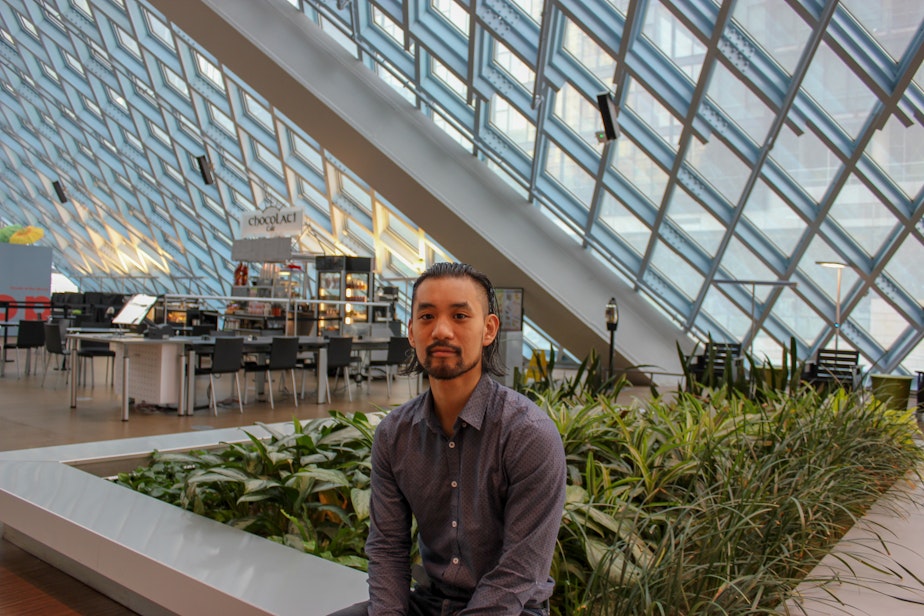5 tips for spotting fake news from this Seattle librarian

Real headline or surreptitious propaganda? In the past few years, that's become harder to answer.
The Seattle Public Library is here to help. The library offers a free class called “Fake News Survival Guide,” taught by librarian Di Zhang. He joined Bill Radke in studio to discuss how we can all avoid getting suckered by propaganda.
Check out the Seattle Public Library's event calendar to see next time Zhang will host Fake News Survival Guide.
Librarian Di Zhang discusses how to spot fake news
"Consume the content with a critical eye, and that's hardest to do when you're emotionally invested or you believe in the cause."
-Di Zhang
Sponsored
1
Resist the urge to share the story right away, especially if something is resonating with you emotionally. Take a few minutes to determine the following: Who published the story? Are they reputable? What have other people said about this publisher?
2
Check to see if this story has been debunked on reputable fact-checking sites like Snopes or Politifact.
3
Determine whether the article is satire. Did you read the article fully? To check if what you're reading is satire, it's often as straightforward as reading the "about" page of a publisher.
4
Give the Seattle Public Library a call, visit the reference desk in-person, or send a librarian an e-mail with your "fake news" inquiry. Reference librarians are available to answer your questions and help find resources that can assist you.
5
Check out different perspectives other than your own. If you lean on the liberal end like I do, check out conservative outlets. A great resource that I often recommend is allsides.com.
Allsides.com presents news articles from across the political spectrum. So any given topic, you're likely to see coverage from a variety of perspectives.
Sponsored
Examples of fake news:
- Pope Francis endorses Donald Trump for president
- Charles Manson to be released on parole to Johnson County Texas
- Babysitter transported to hospital after inserting a baby in her vagina
Interview highlights have been lightly edited for clarity
Bill Radke: Why are you teaching a Fake News Survival Guide class?
Sponsored
Di Zhang: We're teaching this class because around the time of the 2016 election, our patrons started coming to us as they were discovering articles on their social media accounts that they found questionable, or they didn't know quite well what to make of it and how to evaluate whether they were true or not.
It's 2019. Are fake news stories still of the partisan, political variety, or are we on to something different now?
Politics is still one of the major categories. In 2016, BuzzFeed did an in-depth analysis of fake news. They found one of the dominant trends was fake crime stories cropping up online.
So a lot of these you see are really outrageous. It's kind of just click bait to get you to click on the news article and maybe share because it's so outrageous.
It's so outrageous that it's almost not what I think of as fake news. It doesn't seem designed to really fool anyone or persuade anyone. It's just silliness, isn't it?
Some of it can be silliness, and then some of it can be highly partisan and politically charged and do some damage.
In fact, one of the top 2018 news articles that were fake was Barbara Bush dies at 92, and this came out before she actually died. So you can imagine kind of the impact that may have had on the Bush family or others close to them.
How do you mark the difference between fake news and satire?
There can often be a fine line. A lot of these websites that create fabricated stories put in their "about" section that they're fantasy news or satirical news, but it doesn't take away from the fact that people shared this widely and many, many people believe the stories.
Using the term 'satire' often is kind of a cover, and lets them off the hook of possible legal action...
I always try to empower the consumer to actually look at who's creating it and for what reason.
What else should I do to know whether something is fake news or not?
The urge to share right away, especially if something connects with you emotionally. It's happened to me before; I've shared before reading, only to find out that maybe it wasn't the best information....
Consume the content with a critical eye, and that's hardest to do when you're emotionally invested or you believe in the cause.
Yeah, a lot of us share something on social media without actually reading it.
A 2016 study found that 59 percent of Twitter links were shared without actually viewing the article first. That is a big part of the problem and something that we can all take a little time to work against starting with our personal habits.
Maybe I should react to my own sweaty palms, and chill a moment, and really look into this?
The internet is so good at increasing that tribalism and pitting sides against each other because we can get caught up into our own filter bubbles, in our own echo chambers.
The Russians were supposedly trying to exploit that.
Check out different perspectives other than your own. If you lean on the liberal end like I do, check out some conservative outlets as well. A great resource that I often recommend is allsides.com.
It presents news articles from across the political spectrum. So for any given topic, you're likely to see coverage from a variety of perspectives.
Produced for the web by Brie Ripley.




